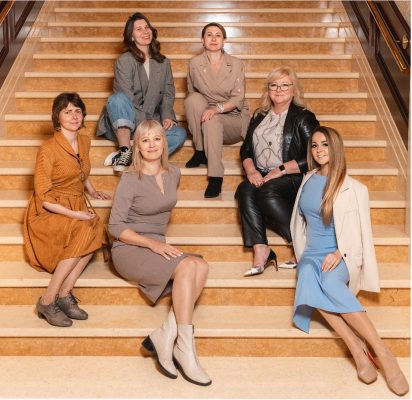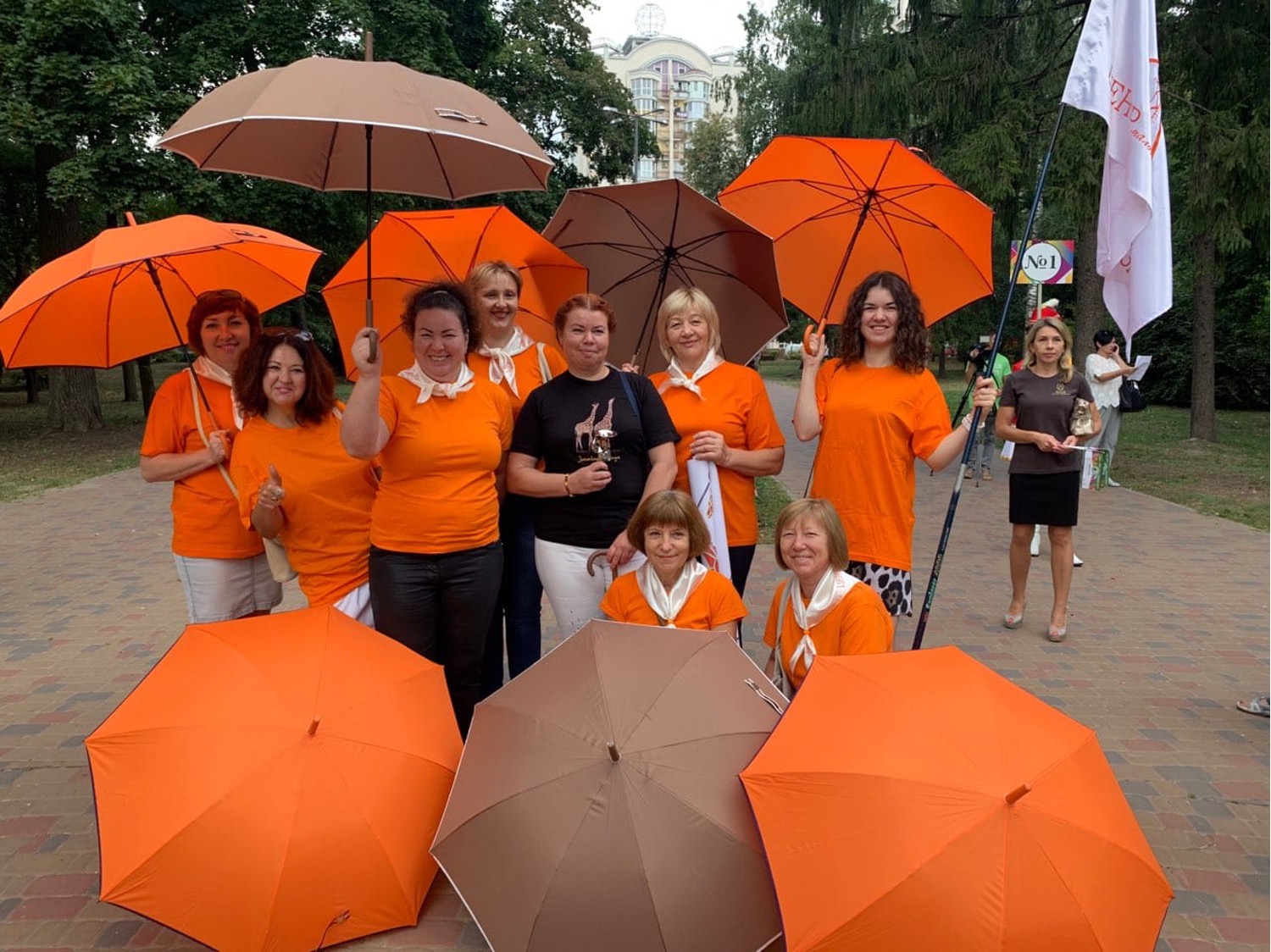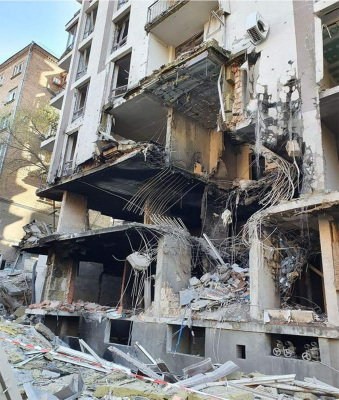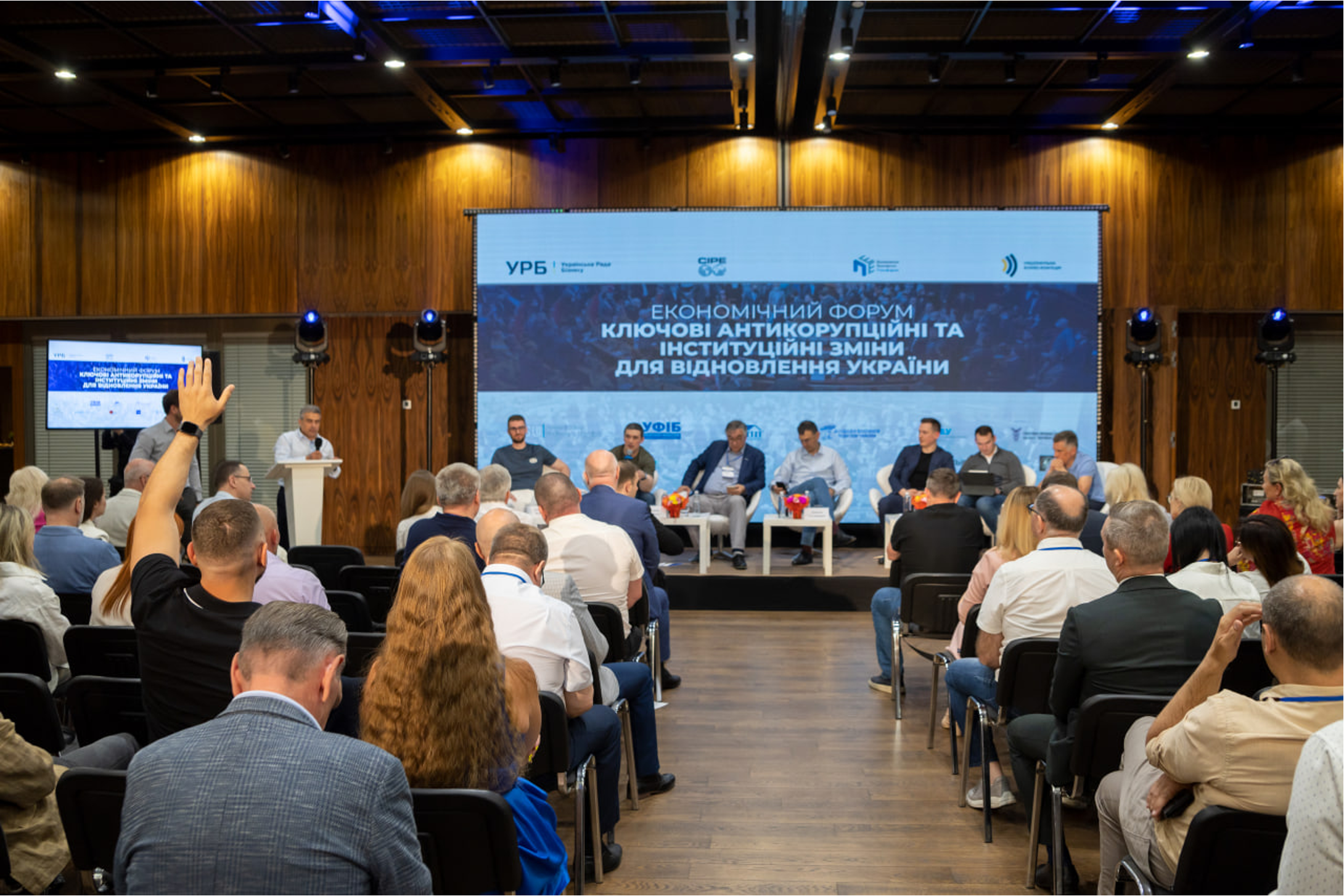Nataliia Zhuhai, CIPE Ukraine Program Officer, recounts her team’s experiences on the second anniversary of war.

February 24 marks the second anniversary of Russia’s full-scale invasion of Ukraine, an event that has brought a harrowing conflict in the heart of Europe. Over the past two years, the toll of this brutal war has been staggering: thousands of lives lost, millions forced to flee their homes, and countless cities and villages reduced to rubble, with damages reaching into the hundreds of billions of dollars. Yet, behind these stark figures lies a deeper narrative – a story not of statistics, but individuals, resilience, and the unwavering commitment to defending Ukraine’s democratic future. It is a story about people, war, partners, emotions, euphoria and despondency, and the daily work of the CIPE Ukraine team during two exhausting years of war.
For many, February 24 is engraved into memory with vivid detail. For several weeks we had been bracing for evacuation: car filled with gasoline, emergency bag packed, filled with a mix of fear and uncertainty, the reality of war descended upon us with a suddenness that no preparation could mitigate. That early morning, the explosions rattled our homes. Amidst the tumult, there is no time for denial, hysteria, or stupor. The kids! We had to get our kids to safety! Within half an hour, we were on our way to the west of the country along alternative roads to avoid the traffic jams on the main highways. I remember the long lines of cars waiting for gas and the Ukrainian military vehicles heading our way. We were leaving, feeling like everything was lost – our homes, jobs, everything we loved and had worked for years. Then, for the first time in my life, I had a panic attack, struggling to breathe and calm down. In the back seat, three children didn’t fully understand that their happy, carefree lives had changed forever just yesterday.
“A call from Lucas, our security officer, woke me up that morning. He asked me to confirm that a full-scale war had indeed begun,” Oksana, Director of CIPE Ukraine’s office, shares. “Soon after, I saw the dictator on TV, heard the first explosions in Kyiv, and got a flood of calls from family, friends, and colleagues… Suddenly, my whole world felt as small as our apartment, and I realized life would never be the same… The question of whether to leave was tough. But with my son in Kyiv, leaving was not an option for me. Plus, I am from Donetsk, which has been occupied since 2014 and my family had to leave in 2016, losing everything. Should we run again? I’ve decided to stay.”
After getting over the initial shock, our team took action. We reached out to our partners, who were surprised and relieved to hear we were still in Ukraine. Most of them have stayed, working hard to support their communities’ urgent needs, from supplying the army to aiding civilians. We faced a crucial question regarding our role. For years, we have helped associations grow and build their capacity. The answer was clear: we could assist in setting up new logistical networks and supporting humanitarian hubs.
We remember reaching out to Iryna Berezynets, the head of the Chernihiv Business Association. Chernihiv, only 66 km from the border with Belarus, was gravely exposed to the Russian invasion due to its geographical position. The city faced severe bombardment, lacking essentials like water, gas, and electricity, with its bridges destroyed and encircled by forces. When I contacted Iryna, she was en route to Poland. Overwhelmed by the situation, crying out in despair: “The Russians are shooting up houses in villages for no reason!” Despite her distress, she continued on her journey. It was her first trip to Poland to gather humanitarian aid. The Ukrainian army managed to hold off the invaders from Chernihiv for one month, one week and two days, and throughout this harrowing period, Iryna remained committed to her city.

There are countless individuals like Iryna: colleagues, partners, entrepreneurs, all stepping up in this crisis. Our grantees in Lviv are setting up a vast platform to coordinate international aid. The Ukrainian Agri Council is distributing grain to the most affected regions and building shelters for internally displaced persons (IDPs). Meanwhile, The Ukrainian Business Council is working on producing and delivering essential supplies, including bulletproof vests, to the army. We are supporting them with a humanitarian logistics hub, blending our work duties with volunteer efforts. The notion of sleep seems almost wasteful in these times, as we operate with the efficiency and purpose of a beehive, each of us clear on our roles.
Then, the devastating news of the first casualties among our circle reached us. They were not the war’s first victims, but they were the first that hit home for us. A call to a grantee in Kropyvnytskyi for a project update took a tragic turn when she informed us that her daughter, an entrepreneur who joined the army with her husband a few weeks ago, was killed by an enemy shell in the same trench as her spouse. Words about the work froze on our lips.
The death toll rises, and our Facebook feeds are flooded with messages marked by black ribbon. A mix of anger and helplessness overwhelms us.
And then we heard the news from Irpin, Bucha, and Mariupol. “Mariupol brings the deepest sorrow,” Oksana remembers. “I spent 11 years of my childhood there. It is where I grew up, made lifelong friends, went to school, and celebrated my first sports victories… Now, all those memories are buried under the rubble of a theater destroyed by a Russian bomb. I have been robbed of my homeland twice – first Donetsk, now Mariupol is gone, too…”
The initial victories of the Ukrainian military reignited our sense of hope. There is a sense of euphoria. We’ve survived the initial onslaught and emerged stronger, convinced of our resilience. That summer, we gradually returned to our routine activities. Ukraine saw a unique opportunity to implement long-delayed reforms, make significant progress in the fight against corruption, and lay the groundwork for economic recovery. Our projects shifted focus to align with these priorities, each of us committed to the country’s recovery.

Despite moments of hope, Russia relentless assaults with missiles, guided bombs and Shaheds drones ensure we remain vigilant. We have become unwilling experts in responding to air strikes. No one is panicking. Everyone is equipped with a special app on their smartphones and follows monitoring chats to stay informed about the type of ammunition being launched. This allows us to make informed decisions on how to react to each threat, whether taking cover hiding behind two walls is sufficient, or if we need to go to a shelter. Kyiv’s skies are among the most protected, thanks to the support of our international allies, yet the uncertainty of how many more attacks we’ll face looms large. Even the debris of these attacks could cause casualties and destruction. In one such attack, a rocket struck a building in Oksana’s neighborhood, claiming the life of a journalist from Radio Svoboda in her apartment.
In total, Russia has launched nearly 7,500 missiles.
“Air raid alerts have become a routine part of our lives,” Oksana says. “Ensuring the safety of our partners is our top priority when we organize large-scale events.”
We recall a CIPE-supported forum in Kyiv vividly. That morning, as an alarm sounded signaling a rocket attack on the country, we immediately started discussion with partners on how to proceed. Despite the forum’s ground-floor venue, the challenge remained for participants to safely get there. Our partners from the Odesa Business Association determined, saying: “We’ll navigate through subway tunnels if we have to, but we’ll make it. It’s crucial we meet to discuss important reforms with the government”. With that, the decision is made. Adapting to such realities has become the norm, and we understand the coming months will not be safer.

“Working alongside partners like ours, you cannot afford to let them down,” Oksana reflects. “We all try to hold the line, keeping calm and avoiding panic. There is an incredible sense of solidarity among us. We lean on each other for support. Giving up would mean all our efforts and losses have been in vain”.
War poses the greatest challenge to democracy, stripping away the most fundamental right – the right to life. For totalitarian regimes, individual lives are expendable, but in democracies, they’re held as the utmost value. For us, life holds immense value, as does freedom of thought, entrepreneurship, and active participation in shaping our future. Upholding these values amidst the turmoil of war is a huge challenge, yet one we are prepared to undertake. We are ready!
Published Date: March 05, 2024
